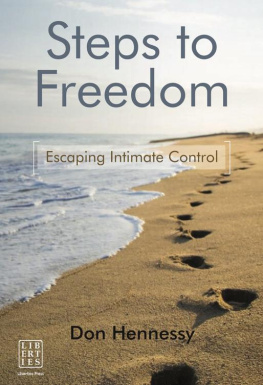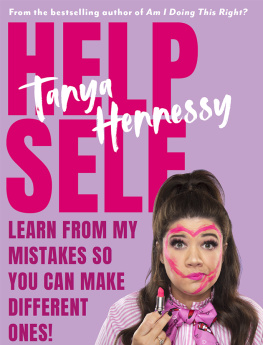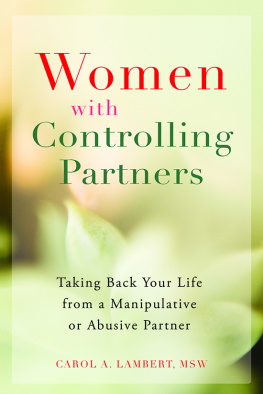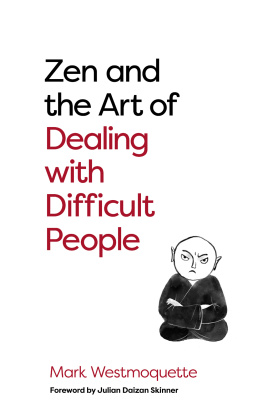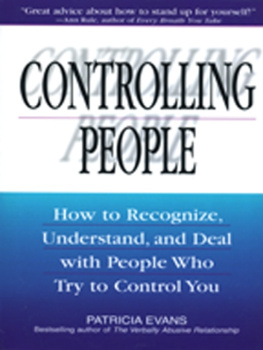Don Hennessy - Steps to Freedom: Escaping Intimate Control
Here you can read online Don Hennessy - Steps to Freedom: Escaping Intimate Control full text of the book (entire story) in english for free. Download pdf and epub, get meaning, cover and reviews about this ebook. year: 2018, publisher: Liberties Press, genre: Religion. Description of the work, (preface) as well as reviews are available. Best literature library LitArk.com created for fans of good reading and offers a wide selection of genres:
Romance novel
Science fiction
Adventure
Detective
Science
History
Home and family
Prose
Art
Politics
Computer
Non-fiction
Religion
Business
Children
Humor
Choose a favorite category and find really read worthwhile books. Enjoy immersion in the world of imagination, feel the emotions of the characters or learn something new for yourself, make an fascinating discovery.
- Book:Steps to Freedom: Escaping Intimate Control
- Author:
- Publisher:Liberties Press
- Genre:
- Year:2018
- Rating:4 / 5
- Favourites:Add to favourites
- Your mark:
- 80
- 1
- 2
- 3
- 4
- 5
Steps to Freedom: Escaping Intimate Control: summary, description and annotation
We offer to read an annotation, description, summary or preface (depends on what the author of the book "Steps to Freedom: Escaping Intimate Control" wrote himself). If you haven't found the necessary information about the book — write in the comments, we will try to find it.
Steps to Freedom: Escaping Intimate Control — read online for free the complete book (whole text) full work
Below is the text of the book, divided by pages. System saving the place of the last page read, allows you to conveniently read the book "Steps to Freedom: Escaping Intimate Control" online for free, without having to search again every time where you left off. Put a bookmark, and you can go to the page where you finished reading at any time.
Font size:
Interval:
Bookmark:
To my wife Marguerite, who has helped
me understand what love is
In writing this book, I have had the good fortune to be guided, encouraged and challenged by Rio Ceederlund PhD. Rio has the extraordinary gift of making scientific sense of my thoughts. Her contribution is spread throughout the book. My hope is that she will continue to research the work and eventually produce evidence of the best way to protect target-women. I am privileged and grateful to have worked with her.
My gratitude also goes to Carmel ONeill from Australia, who has help me explore the issue in a more in-depth way and has shared her extensive knowledge with me. Thanks to many of my current and recent clients who are aware of this book, and to tell them that I am in awe of their encouragement and their clarity. As before, I want to especially acknowledge my colleague Fionnula Sheehan, who corrected my script and supported my efforts with a powerful mixture of wisdom and energy. Any remaining mistakes are mine not hers. Finally, thanks to Sean OKeeffe and his colleagues at Liberties Press for publishing the book.
Don Hennessy
February 2018
T his book is written in the hope that a woman who is being abused by her intimate partner will find some help in escaping from the mental torture that underpins this abuse. It may also be of help to those men who suffer similar abuse, though I have little experience of working with such men.
The core of the message in this book is that you, the abused woman, have been mentally coerced in a way that invades your slow or analytical thinking and quietens your instinctive thinking. I hope to show you how this invasion took place without you knowing it, and how to recover your mind. Having worked with abused women for more than twenty years, I have developed a series of steps which can help to repel this invasion and help you recover the use of your intuition. This recovery will allow you to begin to think without confusion and to follow your own instincts.
This book also comes with a safety warning. My clients respond to my guidance in many different ways. Some reject my suggestions because they see some danger which I cannot assess. Some reject me because I am a man. Some begin the journey with me, only to become anxious and stuck, and do not make progress. Some walk all the way with me but are seduced back into the old relationship. Some women come back to me after several years, to see if we can work together towards making them safe. Please remember, as you read on, that you are the expert in your own safety. A book like this can be very dangerous, because I have never met your abuser, and he may have some traits which are outside the norm. If your abuser is an addict, he may have a very different persona at times. If your abuser has a mental illness, there may be times when he loses his ability to think. Though he may have one of these problems, he may retain enough rationality to continue to blame you for his behaviour. You may feel that it is your duty to care for such a man. Reading this book may help you to divest yourself of this responsibility. When you no longer see yourself as the source of his bad behaviour, you can respond to him without anger or guilt. You may still feel afraid, and even sometimes terrified: these are instinctive reactions to the risks you face. I hope that, together, we can expand your instinctive reactions so that you may begin to follow them in all parts of your life.
It almost seems as if we humans, despite the ability in the majority of us to have compassion for others, have a mental shield to protect us from fully grasping the extent of fear and pain another person experiences. It seems similar to the way we forget the full extent of pain from the time we broke a leg, gave birth to a child, ran an exhausting race, or endured some other very painful situation. We simply do not remember all the gruesome details. Perhaps this is the case when your friends and others listen to your story. We simply do not grasp the full extent of the terror. I have learned that a full understanding of the actual emotions is not necessary in order to fully trust and support a target-person. If the highly distinguishing patterns of abuse dynamics are present, I know what they imply. I hope that any reader of this book target or other will gain a greater understanding of their situation, despite this protective shield we humans seem to have.
It is very likely that your mind provides you with many explanations for why you get these bad feelings. These explanations are skewed by the abuser, and your situation. Do not rush to challenge the very thoughts you have: they will be virtually impossible to challenge at first. Give it time and, step by step, your reading will give you solid access to alternative thoughts. Take note of any gut feeling or fleeting thought that something bad is lurking. You will become aware that in each situation, you will get a new chance to act wisely, based on your gut feeling. Crucially, it is never too late.
I would like to invite you into my office and allow me to address my thoughts directly to you.
The path to psychological freedom from abuse goes through phases. This process is very much one of two steps forward, one step back, and sometimes even one step forward, two steps back. The phases seem to follow each other in a roughly orderly fashion.
First, you learn about the common characteristics of the abusive behaviours. The underlying dynamics appear universal, and are repeated with almost mechanical precision, regardless of the various characteristics of the couple. You will recognise most or all the ways your partner acts, but you will learn more in depth, exactly how the abuse is so effective. You will then learn more about your reactions to this abuse: what you think, what you feel, what you do in response to these thoughts and feelings, and how you handle the abuse. Again, you will recognise most or all of the ways, but you will get a brand new framework of knowledge to understand your reactions.
At last, you will practise the new things you have learned, confirm your own wisdom and learn to take one small step at a time. The basics are easy to explain in theory, but you will have to try, and retry, several times so that you can use your learning for your benefit. Some clients do not meet the abuser physically but the person still haunts their minds. You will see that the same process of change takes place with your reoccurring thoughts about your abuser and the emotions you then feel.
Alongside this process, which will happen in your own mind, you will also find that you may start to reach out to the outside world in a new way. I know that the very thought of reaching out to family, friends or other people can make you feel helpless and numb. Dont worry about that now. Instead, be certain that I will address these feelings of hopelessness and alienation in a way that is aimed at building hope through developing solid knowledge. The hopelessness is a core feature of the abuse, and I will discuss it thoroughly. To give you a glimpse of whats coming up: I will not tell you in what ways you will make the practical changes in your life, because any such suggestions risk clashing with your personal situation, resources and desires. To use a metaphor: I cannot give each of you a detailed map of your life and relationship because I am not there to see it, and I can never understand exactly where you are, or where you want to go. Instead, I will offer you a way to draw your very own map, and I will give you several examples of how that can be done.
It may be that you have tried to change the way you handle the situation so many times, that you dont want more advice, or another way to change, because you think it wont work anyway. Youve picked up this book, so perhaps you dont feel as hopeless this very moment; but at some stage while considering your situation, you might have felt confused. Let me then give you an instant example of how this map-making will happen. Youll get new knowledge, and thus find ways to walk through your situation at your own pace, and with the resources that are available to you. Here is a fact about abuse dynamics that you may have learned, repeatedly: the constant struggle to either understand the abuser, or to change the abuser or yourself to avoid further abuse (or both) has not worked. The ongoing monologue in your head, or with your friends, or with other people, such as a counsellor or social worker, is exhausting, and too often leads nowhere. This is the case for every person who is a target of intimate abuse. When you heard about learning yet another way to change yourself, its likely that at some point you got hopeless thoughts, felt sad and angry, and put the book away temporarily. I believe that the very core of this exhaustion and hopelessness is that our everyday language lacks words to properly understand and explain coercive-controlling behaviour; this means that you have no possible way of either understanding it properly or explaining it to others. You may have sat through hours of counselling or friendly advice from others, biting back the feelings of hopelessness or anger, or even desperation, caused by not being able to make yourself understood. Neither can you understand, or explain, your abuser. You may have asked yourself how anyone can take charge over, and change, a situation that they are unable to explain.
Font size:
Interval:
Bookmark:
Similar books «Steps to Freedom: Escaping Intimate Control»
Look at similar books to Steps to Freedom: Escaping Intimate Control. We have selected literature similar in name and meaning in the hope of providing readers with more options to find new, interesting, not yet read works.
Discussion, reviews of the book Steps to Freedom: Escaping Intimate Control and just readers' own opinions. Leave your comments, write what you think about the work, its meaning or the main characters. Specify what exactly you liked and what you didn't like, and why you think so.

